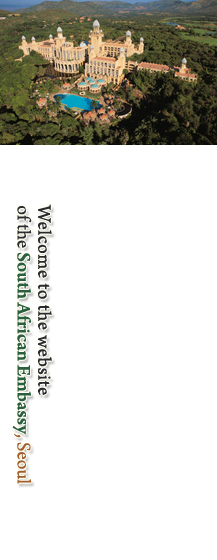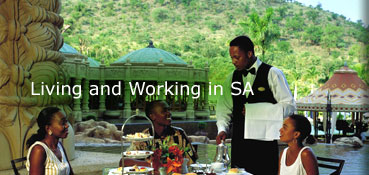
 |
 |
 |
 |
 |
 |
 |
 |
 |

 |
|
Since 1994, South Africa has emerged as a sophisticated and promising investment destination. The unique combination of a highly developed first world economic infrastructure and a huge emergent market, has given rise to a strong entrepreneurial and dynamic investment environment, with many global competitive advantages and opportunities. Thus, living and working in this young democracy presents exciting opportunities and challenges for the entrepreneurial and energetic business community.
South Africa offers diverse and abundant natural splendour and a year-round temperate climate. Foreign visitors and residents are able to purchase fully serviced properties at a significantly lower cost compared to similar properties in the western world. The low cost of living, the availability of first-world health care, education, sporting and recreation facilities and other modern conveniences and luxuries, make the South African lifestyle one of the most attractive in the world.
With a dynamic fusion of African, European and Asian influences, South Africa is a hotbed of originality and creativity and it is the interplay between our various cultures and the heritage of our individual and shared histories which shapes our nation. South Africa’s diverse heritage has endowed the country with a very interesting culture. The cuisine celebrates influences from three continents; the wine borrows the best from the Old World while imbuing it with the freshness of New World influences. The languages are colourful and borrow freely from each other in both vocabulary and sentence structure. South Africans - no matter what the ethnic backgrounds - share aspects of each other's cultures, and use phrases and words from each other's languages. South Africa has 11 official languages: Afrikaans, English, Ndebele, North Sotho, South Sotho, Swati, Tsonga, Tswana, Venda, Xhosa and Zulu. However, most South Africans speak English to a greater or lesser degree, so you'll have no trouble being understood. Other languages, which are widely spoken by South African citizens, but are not official, include Gujerati, Hindi, Arabic, Hebrew, Greek, German and Portuguese. The Nama and Khoi-San people speak languages that are not widely recognised outside their own communities. South African art and music display a wild blend of the classical with the innovative, of the tried and tested with the new and experimental. So, the best way to appreciate South Africa’s cultural diversity is to arrive with not too many preconceptions, as South Africa is bound to surprise you. In South Africa you can experience the adventure of living in a truly multicultural society.
The South African education system is seen as pivotal to contributing quality of life and to building a democratic nation. The aim is to provide equal access to life-long education. Education is enshrined in the Constitution as a basic human right. The South African education system comprises over 12,3 million learners, including 300 000 university students and 190 000 university of technology students. Read more
HIV / AIDS remains the biggest of all the many challenges facing South Africa, and the government and leading corporations are developing strategies to help the workforce cope with the illness. According to UN AIDS figures, an estimated 4.2 million South Africans are living with HIV and AIDS, approximately 1 out of 10 people. On present trends, the average life expectancy in South Africa will be cut to 45 by 2010, against 70 for those without HIV / AIDS. For more information, go to Department of Health
Reducing crime is one of the leading challenges of South Africa's democratic government. In 1999, the government implemented policy and developed a strategy to enhance national crime combating capabilities. For more information, go to http://www.saps.org.za |
